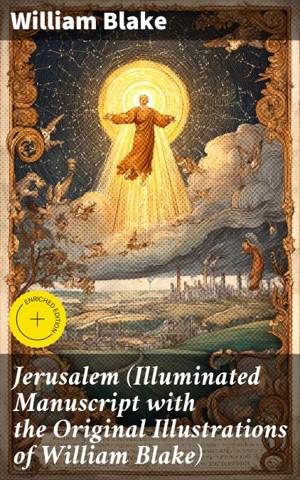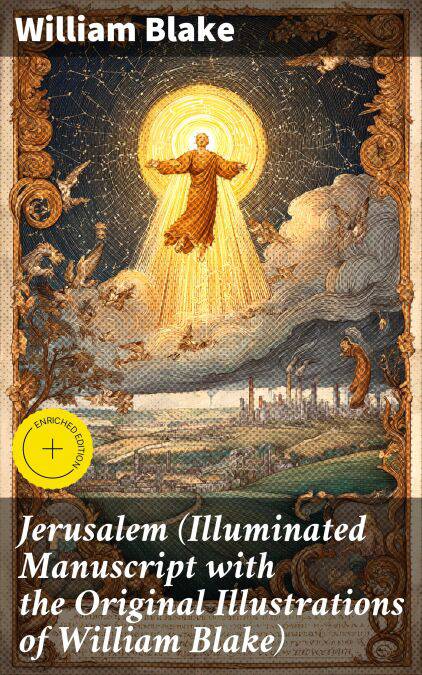
- Afhalen na 1 uur in een winkel met voorraad
- Gratis thuislevering in België vanaf € 30
- Ruim aanbod met 7 miljoen producten
- Afhalen na 1 uur in een winkel met voorraad
- Gratis thuislevering in België vanaf € 30
- Ruim aanbod met 7 miljoen producten
Zoeken
Jerusalem (Illuminated Manuscript with the Original Illustrations of William Blake) E-BOOK
Enriched edition. Visions of Divine Light and Rebel Spirits
William Blake
E-book | Engels
€ 0,49
Uitvoering
Omschrijving
William Blake's "Jerusalem" is a profound exploration of the relationship between the material and spiritual realms, presented through his distinctive illuminated manuscript style. Written in the late 18th century and characterized by rich symbolism and visionary imagery, the text weaves together themes of redemption, social justice, and the quest for a transformative England. Blake's striking illustrations serve not merely as embellishments but as integral components that deepen the reader's understanding of the poem's intricate philosophical and theological underpinnings. The work reflects the fervent spirit of Romanticism, positioning itself against the backdrop of the Industrial Revolution and the socio-political upheaval of Blake's time. William Blake (1757-1827) was not only a poet but also a painter, engraver, and visionary philosopher, whose unyielding belief in the power of imagination profoundly influenced his artistic endeavors. A figure often ahead of his time, Blake's own experiences with social exclusion and spirituality undoubtedly shaped the themes present in "Jerusalem." His rejection of conventional norms allowed him to create a work that challenged societal structures and championed an idealized vision of human potential. "Jerusalem" is a compelling read for anyone interested in the intersections of art, poetry, and philosophy. Blake's fusion of text and imagery invites readers to forge a deeper connection with their own spiritual journeys while contemplating the urgent social issues of his day. A testament to the power of imagination and creativity, this work is essential for scholars, poets, and lovers of art alike.
In this enriched edition, we have carefully created added value for your reading experience:
- A succinct Introduction situates the work's timeless appeal and themes.
- The Synopsis outlines the central plot, highlighting key developments without spoiling critical twists.
- A detailed Historical Context immerses you in the era's events and influences that shaped the writing.
- An Author Biography reveals milestones in the author's life, illuminating the personal insights behind the text.
- A thorough Analysis dissects symbols, motifs, and character arcs to unearth underlying meanings.
- Reflection questions prompt you to engage personally with the work's messages, connecting them to modern life.
- Hand‐picked Memorable Quotes shine a spotlight on moments of literary brilliance.
- Interactive footnotes clarify unusual references, historical allusions, and archaic phrases for an effortless, more informed read.
In this enriched edition, we have carefully created added value for your reading experience:
- A succinct Introduction situates the work's timeless appeal and themes.
- The Synopsis outlines the central plot, highlighting key developments without spoiling critical twists.
- A detailed Historical Context immerses you in the era's events and influences that shaped the writing.
- An Author Biography reveals milestones in the author's life, illuminating the personal insights behind the text.
- A thorough Analysis dissects symbols, motifs, and character arcs to unearth underlying meanings.
- Reflection questions prompt you to engage personally with the work's messages, connecting them to modern life.
- Hand‐picked Memorable Quotes shine a spotlight on moments of literary brilliance.
- Interactive footnotes clarify unusual references, historical allusions, and archaic phrases for an effortless, more informed read.
Specificaties
Betrokkenen
- Auteur(s):
- Uitgeverij:
Inhoud
- Aantal bladzijden:
- 5
- Taal:
- Engels
Eigenschappen
- Productcode (EAN):
- 8596547687559
- Verschijningsdatum:
- 4/12/2023
- Uitvoering:
- E-book
- Beveiligd met:
- Digital watermarking
- Formaat:
- ePub

Alleen bij Standaard Boekhandel
Beoordelingen
We publiceren alleen reviews die voldoen aan de voorwaarden voor reviews. Bekijk onze voorwaarden voor reviews.







